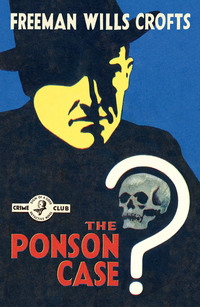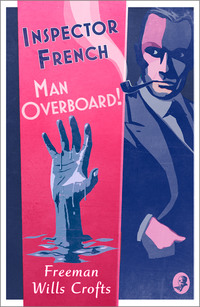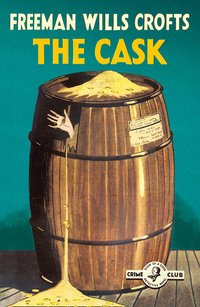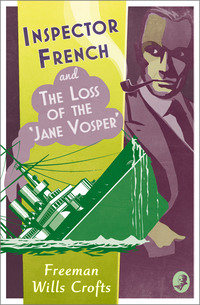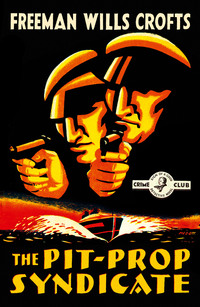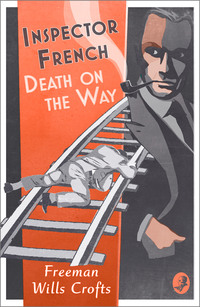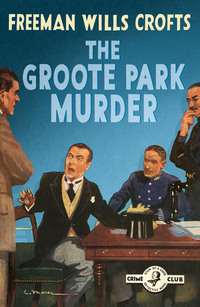
Полная версия
The Pit Prop Syndicate
The interruption broke the spell. The driver averted his eyes and stooped over his engine; Merriman turned towards the girl, and the little incident was over.
It was evident to Merriman that he had in some way put his foot in it, how he could not imagine, unless there was really something in the matter of the number plate. But it was equally clear to him that his companion wished to ignore the affair, and he therefore expelled it from his mind for the moment, and once again following the direction of her gaze, moved towards a man who was approaching from the far end of the shed.
He was tall and slender like his daughter, and walked with lithe, slightly feline movements. His face was oval, clear skinned, and with a pallid complexion made still paler by his dark hair and eyes and a tiny mustache, almost black and with waxed and pointed ends. He was good-looking as to features, but the face was weak and the expression a trifle shifty.
His daughter greeted him, still with some perturbation in her manner.
"We were just looking for you, daddy," she called a little breathlessly. "This gentleman is cycling to Bordeaux and has run out of petrol. He asked me if there was any to be had hereabouts, so I told him you could give him some."
The newcomer honored Merriman with a rapid though searching and suspicious glance, but he replied politely, and in a cultured voice:
"Quite right, my dear." He turned to Merriman and spoke in French. "I shall be very pleased to supply you, monsieur. How much do you want?"
"Thanks awfully, sir," Merriman answered in his own language. "I'm English. It's very good of you, I'm sure, and I'm sorry to be giving so much trouble. A liter should run me to Bordeaux, or say a little more in case of accidents."
"I'll give you two liters. It's no trouble at all." He turned and spoke in rapid French to the driver.
"Oui, monsieur," the man replied, and then, stepping up to his chief, he said something in a low voice. The other started slightly, for a moment looked concerned, then instantly recovering himself, advanced to Merriman.
"Henri, here, will send a man with a two-liter can to where you have left your machine," he said, then continued with a suave smile:
"And so, sir, you're English? It is not often that we have the pleasure of meeting a fellow-countryman in these wilds."
"I suppose not, sir, but I can assure you your pleasure and surprise is as nothing to mine. You are not only a fellow-countryman but a friend in need as well."
"My dear sir, I know what it is to run out of spirit. And I suppose there is no place in the whole of France where you might go farther without finding any than this very district. You are on pleasure bent, I presume?"
Merriman shook his head.
"Unfortunately, no," he replied. "I'm travelling for my firm, Edwards & Merriman, Wine Merchants of London. I'm Merriman, Seymour Merriman, and I'm going round the exporters with whom we deal."
"A pleasant way to do it, Mr. Merriman. My name is Coburn. You see I am trying to change the face of the country here?"
"Yes, Miss"—Merriman hesitated for a moment and looked at the girl—"Miss Coburn told me what you were doing. A splendid notion, I think."
"Yes, I think we are going to make it pay very well. I suppose you're not making a long stay?"
"Two days in Bordeaux, sir, then I'm off east to Avignon."
"Do you know, I rather envy you. One gets tired of these tree trunks and the noise of the saws. Ah, there is your petrol." A workman had appeared with a red can of Shell. "Well, Mr. Merriman, a pleasant journey to you. You will excuse my not going farther with you, but I am really supposed to be busy." He turned to his daughter with a smile. "You, Madeleine, can see Mr. Merriman to the road?"
He shook hands, declined Merriman's request to be allowed to pay for the petrol and, cutting short the other's thanks with a wave of his arm, turned back to the shed.
The two young people strolled slowly back across the clearing, the girl evidently disposed to make the most of the unwonted companionship, and Merriman no less ready to prolong so delightful an interview. But in spite of the pleasure of their conversation, he could not banish from his mind the little incident which had taken place, and he determined to ask a discreet question or two about it.
"I say," he said, during a pause in their talk, "I'm afraid I upset your lorry man somehow. Did you notice the way he looked at me?"
The girl's manner, which up to this had been easy and careless, changed suddenly, becoming constrained and a trifle self-conscious. But she answered readily enough.
"Yes, I saw it. But you must not mind Henri. He was badly shell-shocked, you know, and he has never been the same since."
"Oh, I'm sorry," Merriman apologized, wondering if the man could be a relative. "Both my brothers suffered from it. They were pretty bad, but they're coming all right. It's generally a question of time, I think."
"I hope so," Miss Coburn rejoined, and quietly but decisively changed the subject.
They began to compare notes about London, and Merriman was sorry when, having filled his tank and pushed his bicycle to the road, he could no longer with decency find an excuse for remaining in her company. He bade her a regretful farewell, and some hall-hour later was mounting the steps of his hotel in Bordeaux.
That evening and many times later, his mind reverted to the incident of the lorry. At the time she made it, Miss Coburn's statement about the shell-shock had seemed entirely to account for the action of Henri, the driver. But now Merriman was not so sure. The more he thought over the affair, the more certain he felt that he had not made a mistake about the number plate, and the more likely it appeared that the driver had guessed what he, Merriman, had noticed, and resented it. It seemed to him that there was here some secret which the man was afraid might become known, and Merriman could not but admit to himself that all Miss Coburn's actions were consistent with the hypothesis that she also shared that secret and that fear.
And yet the idea was grotesque that there could be anything serious in the altering of the number plate of a motor lorry, assuming that he was not mistaken. Even if the thing had been done, it was a trivial matter and, so far as he could see, the motives for it, as well as its consequences, must be trivial. It was intriguing, but no one could imagine it to be important. As Merriman cycled eastward through France his interest in the affair gradually waned, and when, a fortnight later, he reached England, he had ceased to give it a serious thought.
But the image of Miss Coburn did not so quickly vanish from his imagination, and many times he regretted he had not taken an opportunity of returning to the mill to renew the acquaintanceship so unexpectedly begun.
CHAPTER 2. AN INTERESTING SUGGESTION
About ten o'clock on a fine evening towards the end of June, some six weeks after the incident described in the last chapter, Merriman formed one of a group of young men seated round the open window of the smoking room in the Rovers' Club in Cranbourne Street. They had dined together, and were enjoying a slack hour and a little desultory conversation before moving on, some to catch trains to the suburbs, some to their chambers in town, and others to round off the evening with some livelier form of amusement. The Rovers had premises on the fourth floor of a large building near the Hippodrome. Its membership consisted principally of business and professional men, but there was also a sprinkling of members of Parliament, political secretaries, and minor government officials, who, though its position was not ideal, were attracted to it because of the moderation of its subscription and the excellence of its cuisine.
The evening was calm, and the sounds from the street below seemed to float up lazily to the little group in the open window, as the smoke of their pipes and cigars floated up lazily to the ceiling above. The gentle hum of the traffic made a pleasant accompaniment to their conversation, as the holding down of a soft pedal fills in and supports dreamy organ music. But for the six young men in the bow window the room was untenanted, save for a waiter who had just brought some fresh drinks, and who was now clearing away empty glasses from an adjoining table.
The talk had turned on foreign travel, and more than one member had related experiences which he had undergone while abroad. Merriman was tired and had been rather silent, but it was suddenly borne in on him that it was his duty, as one of the hosts of the evening, to contribute somewhat more fully towards the conversation. He determined to relate his little adventure at the sawmill of the Pit-Prop Syndicate. He therefore lit a fresh cigar, and began to speak.
"Any of you fellows know the country just south of Bordeaux?" he asked, and, as no one responded, he went on: "I know it a bit, for I have to go through it every year on my trip round the wine exporters. This year a rather queer thing happened when I was about half an hour's run from Bordeaux; absolutely a trivial thing and of no importance, you understand, but it puzzled me. Maybe some of you could throw some light on it?"
"Proceed, my dear sir, with your trivial narrative," invited Jelfs, a man sitting at one end of the group. "We shall give it the weighty consideration which it doubtless deserves."
Jelfs was a stockbroker and the professional wit of the party. He was a good soul, but boring. Merriman took no notice of the interruption.
"It was between five and six in the evening," he went on, and he told in some detail of his day's run, culminating in his visit to the sawmill and his discovery of the alteration in the number of the lorry. He gave the facts exactly as they had occurred, with the single exception that he made no mention of his meeting with Madeleine Coburn.
"And what happened?" asked Drake, another of the men, when he had finished.
"Nothing more happened," Merriman returned. "The manager came and gave me some petrol, and I cleared out. The point is, why should that number plate have been changed?"
Jelfs fixed his eyes on the speaker, and gave the little sidelong nod which indicated to the others that another joke was about to be perpetrated.
"You say," he asked impressively, "that the lorry was at first 4 and then 3. Are you sure you haven't made a mistake of 41?"
"How do you mean?"
"I mean that it's a common enough phenomenon for a No. 4 lorry to change, after lunch, let us say, into No. 44. Are you sure it wasn't 44?"
Merriman joined in the laughter against him.
"It wasn't forty-anything, you old blighter," he said good-humoredly. "It was 4 on the road, and 3 at the mill, and I'm as sure of it as that you're an amiable imbecile."
"Inconclusive," murmured Jelfs, "entirely inconclusive. But," he persisted, "you must not hold back material evidence. You haven't told us yet what you had at lunch."
"Oh, stow it, Jelfs," said Hilliard, a thin-faced, eager-looking young man who had not yet spoken. "Have you no theory yourself, Merriman?"
"None. I was completely puzzled. I would have mentioned it before, only it seemed to be making a mountain out of nothing."
"I think Jelfs' question should be answered, you know," Drake said critically, and after some more good-natured chaff the subject dropped.
Shortly after one of the men had to leave to catch his train, and the party broke up. As they left the building Merriman found Hilliard at his elbow.
"Are you walking?" the latter queried. "If so I'll come along."
Claud Hilliard was the son of a clergyman in the Midlands, a keen, not to say brilliant student who had passed through both school and college with distinction, and was already at the age of eight-and-twenty making a name for himself on the headquarters staff of the Customs Department. His thin, eager face, with its hooked nose, pale blue eyes and light, rather untidy-looking hair, formed a true index of his nimble, somewhat speculative mind. What he did, he did with his might. He was keenly interested in whatever he took up, showing a tendency, indeed, to ride his hobbies to death. He had a particular penchant for puzzles of all kinds, and many a knotty problem brought to him as a last court of appeal received a surprisingly rapid and complete solution. His detractors, while admitting his ingenuity and the almost uncanny rapidity with which he seized on the essential facts of a case, said he was lacking in staying power, but if this were so, he had not as yet shown signs of it.
He and Merriman had first met on business, when Hilliard was sent to the wine merchants on some matter of Customs. The acquaintanceship thus formed had ripened into a mild friendship, though the two had not seen a great deal of each other.
They passed up Coventry Street and across the Circus into Piccadilly. Hilliard had a flat in a side street off Knightsbridge, while Merriman lived farther west in Kensington. At the door of the flat Hilliard stopped.
"Come in for a last drink, won't you?" he invited. "It's ages since you've been here."
Merriman agreed, and soon the two friends were seated at another open window in the small but comfortable sitting-room of the flat.
They chatted for some time, and then Hilliard turned the conversation to the story Merriman had told in the club.
"You know," he said, knocking the ash carefully off his cigar, "I was rather interested in that tale of yours. It's quite an intriguing little mystery. I suppose it's not possible that you could have made a mistake about those numbers?"
Merriman laughed.
"I'm not exactly infallible, and I have, once or twice in my life, made mistakes. But I don't think I made one this time. You see, the only question is the number at the bridge. The number at the mill is certain. My attention was drawn to it, and I looked at it too often for there to be the slightest doubt. It was No. 3 as certainly as I'm alive. But the number at the bridge is different. There was nothing to draw my attention to it, and I only glanced at it casually. I would say that I was mistaken about it only for one thing. It was a black figure on a polished brass ground, and I particularly remarked that the black lines were very wide, leaving an unusually small brass triangle in the center. If I noticed that, it must have been a 4."
Hilliard nodded.
"Pretty conclusive, I should say." He paused for a few moments, then moved a little irresolutely. "Don't think me impertinent, old man," he went on with a sidelong glance, "but I imagined from your manner you were holding something back. Is there more in the story than you told?"
It was now Merriman's turn to hesitate. Although Madeleine Coburn had been in his thoughts more or less continuously since he returned to town, he had never mentioned her name, and he was not sure that he wanted to now.
"Sorry I spoke, old man," Hilliard went on. "Don't mind answering."
Merriman came to a decision.
"Not at all" he answered slowly. "I'm a fool to make any mystery of it. I'll tell you. There is a girl there, the manager's daughter. I met her in the lane when I was following the lorry, and asked her about petrol. She was frightfully decent; came back with me and told her father what I wanted, and all that. But, Hilliard, here's the point. She knew! There's something, and she knows it too. She got quite scared when that driver fixed me with his eyes, and tried to get me away, and she was quite unmistakably relieved when the incident passed. Then later her father suggested she should see me to the road, and on the way I mentioned the thing—said I was afraid I had upset the driver somehow—and she got embarrassed at once, told me the man was shell-shocked, implying that he was queer, and switched off on to another subject so pointedly I had to let it go at that."
Hilliard's eyes glistened.
"Quite a good little mystery," he said. "I suppose the man couldn't have been a relation, or even her fiancee?"
"That occurred to me, and it is possible. But I don't think so. I believe she wanted to try to account for his manner, so as to prevent my smelling a rat."
"And she did not account for it?"
"Perhaps she did, but again I don't think so. I have a pretty good knowledge of shell-shock, as you know, and it didn't look like it to me. I don't suggest she wasn't speaking the truth. I mean that this particular action didn't seem to be so caused."
There was silence for a moment, and then Merriman continued:
"There was another thing which might bear in the same direction, or again it may only be my imagination—I'm not sure of it. I told you the manager appeared just in the middle of the little scene, but I forgot to tell you that the driver went up to him and said something in a low tone, and the manager started and looked at me and seemed annoyed. But it was very slight and only for a second; I would have noticed nothing only for what went before. He was quite polite and friendly immediately after, and I may have been mistaken and imagined the whole thing."
"But it works in," Hilliard commented. "If the driver saw what you were looking at and your expression, he would naturally guess what you had noticed, and he would warn his boss that you had tumbled to it. The manager would look surprised and annoyed for a moment, then he would see he must divert your suspicion, and talk to you as if nothing had happened."
"Quite. That's just what I thought. But again, I may have been mistaken."
They continued discussing the matter for some time longer, and then the conversation turned into other channels. Finally the clocks chiming midnight aroused Merriman, and he got up and said he must be going.
Three days later he had a note from Hilliard.
"Come in tonight about ten if you are doing nothing," it read. "I have a scheme on, and I hope you'll join in with me. Tell you when I see you."
It happened that Merriman was not engaged that evening, and shortly after ten the two men were occupying the same arm-chairs at the same open window, their glasses within easy reach and their cigars well under way.
"And what is your great idea?" Merriman asked when they had conversed for a few moments. "If it's as good as your cigars, I'm on."
Hilliard moved nervously, as if he found a difficulty in replying. Merriman could see that he was excited, and his own interest quickened.
"It's about that tale of yours," Hilliard said at length. "I've been thinking it over."
He paused as if in doubt. Merriman felt like Alice when she had heard the mock-turtle's story, but he waited in silence, and presently Hilliard went on.
"You told it with a certain amount of hesitation," he said. "You suggested you might be mistaken in thinking there was anything in it. Now I'm going to make a SUGGESTION with even more hesitation, for it's ten times wilder than yours, and there is simply nothing to back it up. But here goes all the same."
His indecision had passed now, and he went on fluently and with a certain excitement.
"Here you have a trade with something fishy about it. Perhaps you think that's putting it too strongly; if so, let us say there is something peculiar about it; something, at all events, to call one's attention to it, as being in some way out of the common. And when we do think about it, what's the first thing we discover?"
Hilliard looked inquiringly at his friend. The latter sat listening carefully, but did not speak, and Hilliard answered his own question.
"Why, that it's an export trade from France to England—an export trade only, mind you. As far as you learned, these people's boat runs the pit-props to England, but carries nothing back. Isn't that so?"
"They didn't mention return cargoes," Merriman answered, "but that doesn't mean there aren't any. I did not go into the thing exhaustively."
"But what could there be? What possible thing could be shipped in bulk from this country to the middle of a wood near Bordeaux? Something, mind you, that you, there at the very place, didn't see. Can you think of anything?"
"Not at the moment. But I don't see what that has to do with it."
"Quite possibly nothing, and yet it's an INTERESTING point."
"Don't see it."
"Well, look here. I've been making inquiries, and I find most of our pit-props come from Norway and the Baltic. But the ships that bring them don't go back empty. They carry coal. Now do you see?"
It was becoming evident that Hilliard was talking of something quite definite, and Merriman's interest increased still further.
"I daresay I'm a frightful ass," he said, "but I'm blessed if I know what you're driving at."
"Costs," Hilliard returned. "Look at it from the point of view of costs. Timber in Norway is as plentiful and as cheap to cut as in the Landes, indeed, possibly cheaper, for there is water there available for power. But your freight will be much less if you can get a return cargo. Therefore, a priori, it should be cheaper to bring props from Norway than from France. Do you follow me so far?"
Merriman nodded.
"If it costs the same amount to cut the props at each place," Hilliard resumed, "and the Norwegian freight is lower, the Norwegian props must be cheaper in England. How then do your friends make it pay?"
"Methods more up to date perhaps. Things looked efficient, and that manager seemed pretty wide-awake."
Hilliard shook his head.
"Perhaps, but I doubt it. I don't think you have much to teach the Norwegians about the export of timber. Mind you, it may be all right, but it seems to me a question if the Bordeaux people have a paying trade."
Merriman was puzzled.
"But it must pay or they wouldn't go on with it. Mr. Coburn said it was paying well enough."
Hilliard bent forward eagerly.
"Of course he would say so," he cried. "Don't you see that his saying so is in itself suspicious? Why should he want to tell you that if there was nothing to make you doubt it?"
"There is nothing to make me doubt it. See here, Hilliard, I don't for the life of me know what you're getting at. For the Lord's sake explain yourself."
"Ah," Hilliard returned with a smile, "you see you weren't brought up in the Customs. Do you know, Merriman, that the thing of all others we're keenest on is an import trade that doesn't pay?" He paused a moment, then added slowly: "Because if a trade which doesn't pay is continued, there must be something else to make it pay. Just think, Merriman. What would make a trade from France to this country pay?"
Merriman gasped.
"By Jove, Hilliard! You mean smuggling?"
Hilliard laughed delightedly.
"Of course I mean smuggling, what else?"
He waited for the idea to sink into his companion's brain, and then went on:
"And now another thing. Bordeaux, as no one knows better than yourself, is just the center of the brandy district. You see what I'm getting at. My department would naturally be interested in a mysterious trade from the Bordeaux district. You accidentally find one. See? Now what do you think of it?"
"I don't think much of it," Merriman answered sharply, while a wave of unreasoning anger passed over him. The SUGGESTION annoyed him unaccountably. The vision of Madeleine Coburn's clear, honest eyes returned forcibly to his recollection. "I'm afraid you're out of it this time. If you had seen Miss Coburn you would have known she is not the sort of girl to lend herself to anything of that kind."
Hilliard eyed his friend narrowly and with some surprise, but he only said:
"You think not? Well, perhaps you are right. You've seen her and I haven't. But those two points are at least INTERESTING—the changing of the numbers and the absence of a return trade."


